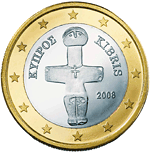|
Economic affairs in Cyprus are dominated by the division of the country into the southern area controlled by the Cyprus Government and the north area of Cyprus, illegally administered by Turkish army. The Cypriot economy was a prosperous one. In 2008 it was classified by the IMF amongst the 32 advanced economies of the world. The IMF forecasts that Cyprus will be the only developed economy to enjoy continuous growth rates through the 2009 financial crisis. Erratic growth rates in the 1990s reflect the economy’s vulnerability to swings in tourist arrivals, caused by political instability on the island and fluctuations in economic conditions in Western Europe. From 1 January 2008, the country entered the Eurozone and adopted the euro and monetary policy is dictated by the European Central Bank. The irrevocable fixed exchange rate of CYP 0.585274 per EUR 1.00 was set. The economy of Turkish Cypriots is about one-fifth of the Greek Cypriots population and one-third the per capita GDP of the south. Because the Turkish-Cypriot de facto administration is recognized only by Turkey, it has had much difficulty arranging foreign financing, and foreign firms have hesitated to invest there. The economy mainly revolves around the agricultural sector and government service, which together employ about half of the work force. The tourism sector also contributes substantially into the economy. Moreover, the small economy has seen some downfalls because the Turkish lira is legal tender. To compensate for the economy’s weakness, Turkey has been known to provide significant financial aid. In both sectors, water shortage is a growing problem, and several desalination plants are planned.
From Wikipedia, the free encyclopedia : Market Trade in textiles, clothing and footwear |
|||||||||||||||||||||||||||||||||||||||||||



